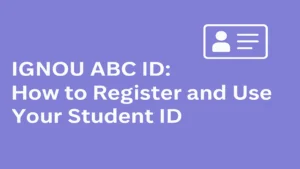When it comes to completing assignments for your IGNOU (Indira Gandhi National Open University) courses, one of the most crucial aspects is selecting the right sources for your research. The quality of sources you use not only affects the accuracy of your work but also determines the credibility of your assignment and ultimately, your grades. This comprehensive guide will take you through the essentials of choosing the right sources for your IGNOU assignments, ensuring that your work is well-researched, backed by reliable information, and properly referenced.
Introduction: The Importance of Choosing the Right Sources for IGNOU Assignments
Overview of IGNOU Assignment Requirements
IGNOU assignments are designed to test your understanding of the course material. They require you to apply your knowledge to practical problems, provide insightful analysis, and support your arguments with evidence. This makes the research process a fundamental part of writing a quality assignment.
To successfully complete your IGNOU assignments, you need to find credible, relevant, and up-to-date sources that back up your arguments. This ensures that your assignments are not only informative but also academically sound.
Why Quality Sources Matter in Academic Writing
The sources you choose play a pivotal role in the strength of your arguments. Using high-quality sources helps establish your work as credible and well-researched. In contrast, relying on weak or unreliable sources can lead to inaccurate conclusions and ultimately lower your grades.
Good sources offer:
- Accuracy: They provide factual, reliable information that enhances the quality of your work.
- Authority: Established, credible sources (e.g., peer-reviewed journals) lend weight to your arguments.
- Relevance: Relevant sources that are closely related to your topic ensure your work is aligned with the subject matter.
Impact of Good Research on Your Grades and Learning
Good research is not just about fulfilling assignment requirements but also about understanding your subject at a deeper level. Properly researched assignments often translate to better grades. Additionally, the process of researching and evaluating sources sharpens your critical thinking skills, making you more adept at analyzing and interpreting data, which is valuable in both academic and real-world scenarios.
Understanding the Types of Sources for IGNOU Assignments
Primary vs. Secondary Sources
Understanding the difference between primary and secondary sources is essential for academic research:
- Primary Sources: These are original, firsthand sources of information that have not been altered or interpreted by others. Examples include surveys, interviews, original research articles, official records, and historical documents.
- Secondary Sources: These sources analyze, interpret, or summarize primary sources. Examples include books, reviews, and meta-analyses.
For most IGNOU assignments, secondary sources such as books, journal articles, and academic reports are commonly used. However, depending on the subject, primary sources might also be valuable, especially in research-based or case-study assignments.
Academic vs. Non-Academic Sources
- Academic Sources: These sources are peer-reviewed, authored by experts, and typically published in academic journals or books. They are considered reliable and scholarly.
- Non-Academic Sources: These include sources like blogs, social media posts, and general websites that may not undergo a rigorous review process. While these sources can be useful for general information, they should be used sparingly and only when relevant.
In academic writing, prioritizing academic sources is crucial for maintaining the credibility of your assignment.
Print vs. Digital Sources: Pros and Cons
- Print Sources: Books, journals, and printed materials are traditional forms of academic sources. These can be found in university libraries or purchased from academic publishers.
- Pros: Often more reliable, accessible in libraries.
- Cons: Harder to access in real-time, can be outdated.
- Digital Sources: Online journals, eBooks, and databases have become increasingly popular.
- Pros: Easily accessible, more up-to-date, extensive variety.
- Cons: Risk of accessing non-credible or outdated online sources.
It’s essential to strike a balance between print and digital sources. While digital resources offer convenience, print sources might provide higher quality and credibility.
Peer-Reviewed Journals: Why They Should Be Your Go-To
Peer-reviewed journals are scholarly articles that have been evaluated by experts in the field before publication. These articles are considered the gold standard for academic research. Using peer-reviewed journals ensures the quality, accuracy, and credibility of the information in your assignment.
Identifying Credible Sources for Academic Writing
What Makes a Source Credible?
A credible source is one that is trustworthy, accurate, and authoritative. Here are some characteristics of credible sources:
- Authorship: The source should be written by an expert or someone with authority in the field.
- Publication Source: Credible sources are often published by reputable institutions like universities, government bodies, or well-known publishing houses.
- Evidence-Based: The information should be backed by data, research, or factual evidence.
- References: A credible source should include a list of references that further validate the content.
How to Evaluate a Source’s Authenticity
To evaluate the authenticity of a source, consider the following:
- Check the Author’s Credentials: Look at the author’s qualifications, affiliation, and experience in the subject matter.
- Publication Date: Ensure the information is recent enough to be relevant to your topic.
- Publisher’s Reputation: Verify the publisher’s reputation. Well-known academic publishers, universities, and government agencies typically publish trustworthy materials.
Where to Find Reliable Sources for IGNOU Assignments
IGNOU’s Own Study Material
IGNOU provides study materials for all its courses, which are usually comprehensive and cover a wide range of topics. These materials are often the first and most important source for any assignment. They provide both foundational knowledge and context for your work.
Digital Libraries and Databases (Google Scholar, JSTOR, etc.)
Digital libraries and academic databases offer access to thousands of peer-reviewed articles, journals, and papers. Google Scholar and JSTOR are two excellent platforms for finding scholarly articles and academic research. Many universities provide access to paid databases, so make sure to take advantage of those as well.
University Libraries and Online Catalogs
Many universities, including IGNOU, offer access to online catalogs and digital libraries. These libraries provide access to a wide array of academic resources such as eBooks, journals, research papers, and more.
Academic Blogs, Websites, and Forums
Academic blogs and forums can also provide valuable insights and recommendations. However, these should be used cautiously. Always verify the information through more authoritative sources.
Other Sources: Reports, Whitepapers, and Government Publications
Government publications, reports, and whitepapers often contain statistical data and insights from reliable sources. They can be highly useful for assignments involving real-world data, policy analysis, or current events.
How to Use Online Resources Effectively
Google Scholar: A Guide for Finding Scholarly Articles
Google Scholar is a free resource that allows you to search for scholarly literature across various disciplines. You can use filters to narrow down your search to recent articles or papers, ensuring the information you gather is relevant and up-to-date. Additionally, many articles on Google Scholar are freely accessible or provide links to full-text versions.
Effective Techniques for Organizing Your Research
Creating a Research Plan
Before diving into your research, it’s crucial to outline a plan. This plan will guide you through the process of gathering information, identifying the most relevant sources, and ensuring that you stay on track. A clear research plan includes:
- Defining Your Research Question: Know exactly what you are trying to find out or prove in your assignment.
- Breaking Down the Assignment: Divide your topic into smaller subtopics or themes. This will help you structure your research and gather targeted information.
- Setting Time Limits: Allocate specific time frames for different stages of research—such as finding sources, reading through them, and taking notes.
Using Citation Management Tools
Citation management tools like Zotero, Mendeley, or EndNote help you organize your sources and citations. These tools automatically format references in the required citation style (APA, MLA, Chicago, etc.), saving you time and ensuring accuracy.
By using these tools, you can:
- Keep track of all your sources in one place.
- Easily create bibliographies.
- Ensure consistency in referencing.
Creating an Annotated Bibliography
An annotated bibliography is a list of sources used in your research, accompanied by a brief summary or evaluation of each source. Creating an annotated bibliography allows you to:
- Keep track of your sources.
- Quickly review the relevance and quality of each source.
- Clarify how each source fits into your research.
Taking Effective Notes
Effective note-taking is essential for organizing your research and avoiding information overload. When reading your sources, make sure to:
- Highlight Key Points: Focus on the main arguments or pieces of evidence.
- Use Summary Statements: Summarize what you’ve read in your own words.
- Organize Notes by Theme: Group your notes based on different subtopics for easier referencing later.
Citing and Referencing Your Sources Correctly
Why Proper Citation is Essential for IGNOU Assignments
Proper citation is not only required to avoid plagiarism but also to give credit to the original authors whose work has informed your research. Correct citation allows others to trace the source of your information and verify its authenticity.
Common Citation Styles Used in IGNOU Assignments
The most commonly used citation styles in IGNOU assignments include:
- APA (American Psychological Association): Widely used in social sciences, psychology, and education.
- MLA (Modern Language Association): Common in humanities and literature subjects.
- Chicago: Often used in history and some social science disciplines.
Make sure you use the citation style recommended by your course. This ensures consistency and helps you avoid any formatting errors.
How to Avoid Plagiarism While Referencing
Plagiarism is a serious offense in academic writing. To avoid plagiarism:
- Always credit the original author when paraphrasing or quoting directly.
- Use proper quotation marks for direct quotes.
- Refer to the specific page number or location of the quote in the citation.
- Avoid over-reliance on paraphrasing and aim to synthesize information in your own words.
Using Citation Generators and Tools
If you find manual citation formatting time-consuming, use citation generators like Cite This For Me or EasyBib. These tools generate citations based on the information you input, saving you time. However, always double-check the formatting to ensure accuracy.
How to Avoid Common Mistakes When Choosing Sources
Relying on Outdated Sources
One of the most common mistakes students make is using outdated sources. While historical sources may be relevant to certain topics, you should always prioritize recent information, especially for subjects related to science, technology, or current events.
Using Only One Type of Source
Don’t rely solely on one source type. For example, if you only use books, your research may lack contemporary insights. Diversify your sources by including journal articles, reports, and credible websites to create a more comprehensive understanding of your topic.
Overlooking the Importance of Peer-Reviewed Literature
Some students may choose convenience over credibility by relying on non-peer-reviewed sources like blogs or personal websites. Always prioritize peer-reviewed journals, as they are more likely to present validated, trustworthy information.
Ignoring the Relevance of the Source to Your Topic
Another common mistake is using sources that aren’t directly relevant to the assignment topic. While broad research may give you a lot of information, make sure your sources directly support your arguments or provide useful evidence.
How to Stay Organized During the Research Process
Creating an Efficient Research Workflow
To streamline your research, set up an efficient workflow. This includes:
- Gathering Sources: Collect all your sources early on, categorize them by relevance.
- Reading and Annotating: Read sources critically and take detailed notes.
- Organizing Notes and References: Use folders, spreadsheets, or software to keep everything in order.
- Writing: Start drafting your assignment once your research is organized and your outline is complete.
Managing Time Effectively
Research can be time-consuming, but with proper time management, you can stay ahead of deadlines:
- Set Deadlines: For each research step (gathering sources, writing, revising).
- Use a Timetable: Allocate specific blocks of time for each task.
- Avoid Procrastination: Start early to avoid the stress of last-minute research.
Key Resources and Tools for Finding Credible Sources
Using Academic Databases
One of the best ways to find high-quality sources for your IGNOU assignments is through academic databases. These platforms provide access to peer-reviewed journals, articles, conference papers, and other scholarly publications. Some popular academic databases include:
- Google Scholar: A free resource that helps you find scholarly articles across multiple disciplines.
- JSTOR: Offers access to journals, books, and primary sources in various academic fields (though some content may require a subscription).
- PubMed: Best for medical, healthcare, and life sciences-related topics.
- Scopus: A leading database for peer-reviewed literature and citation data.
- IEEE Xplore: Excellent for technical and engineering subjects.
These databases ensure that you are referencing the highest quality and most relevant research material.
Government Websites and Reports
For assignments related to social sciences, politics, or policy studies, government websites and reports are often excellent sources of information. Websites like data.gov.in or reports from organizations such as the UN, WHO, and World Bank often contain reliable data and analysis.
Why use them?
- They are usually up-to-date and reliable.
- They provide authoritative, data-backed insights.
- Reports are well-researched and publicly available, making them easily accessible.
Using E-books and Academic Repositories
In addition to traditional journals, e-books can serve as an important source for in-depth information on your topic. Many digital libraries and repositories like Project Gutenberg, Open Library, or Google Books allow access to free academic texts and classic literature.
When searching for e-books:
- Focus on those published by recognized academic institutions or known experts in the field.
- Be cautious with free platforms that may host unreliable or outdated texts.
Collaborating with Your IGNOU Tutors and Peer Groups
Don’t hesitate to ask for recommendations from your IGNOU tutors or join study groups with fellow students. Tutors often have access to valuable resources and can recommend academic articles, books, or journals that align with your course topics. Additionally, your peer group may have already explored certain resources and can share insights about useful references.
Leveraging Online Academic Communities and Forums
There are several online forums where academic professionals and students discuss various topics related to different fields. Websites like ResearchGate, Academia.edu, and specialized subject-based forums allow you to connect with experts and access research that might be hidden behind paywalls.
By participating in these forums, you can:
- Discover niche sources that may not be indexed in traditional databases.
- Ask questions to get expert opinions on your assignment topic.
- Access papers that others in the academic community may have published.
Evaluating the Impact of a Source on Your Assignment
Assessing the Author’s Credentials
Before including a source in your assignment, always assess the author’s credentials. Check if the author has relevant qualifications, affiliations, and experience in the subject matter. For example:
- University Affiliation: Authors affiliated with reputed universities are more likely to produce reliable and peer-reviewed research.
- Professional Experience: A researcher’s experience in a field adds authority to their work.
- Citations and Recognition: A highly cited author or researcher indicates that their work is well-respected in the academic community.
Checking the Date of Publication
As mentioned earlier, the publication date plays a significant role in evaluating the relevance of a source. For assignments in dynamic fields like technology, medicine, or business, use the most recent sources available to ensure that your research reflects the latest developments. In contrast, historical topics may require older sources to preserve context.
Understanding the Bias and Objectivity of the Source
Always check if the source presents the information objectively or has a particular bias. For example, when reviewing articles or studies, ask:
- Is the research conducted in an impartial manner?
- Does the source present all sides of an argument or is it one-sided?
- Does the source cite a wide variety of other credible sources, or does it rely too heavily on personal opinion?
Avoid sources that are overly biased or lack credible citations.
Determining the Scope of the Source
Not every source will cover your topic comprehensively. Assess whether the source provides enough depth or if it’s too narrow in focus. For example, an article on climate change might discuss only renewable energy, but for your assignment, you need a broader scope that covers policy, social impacts, and economic considerations.
Look for sources that:
- Offer a comprehensive analysis.
- Cover multiple aspects of your assignment topic.
- Provide case studies, examples, or data to back up arguments.
How to Handle Multiple Perspectives in Your Assignment
Presenting Contrasting Views
It’s important to address various perspectives when writing your assignment. Contrasting views strengthen your arguments and show that you’ve explored multiple dimensions of the issue. To present contrasting views effectively:
- Use direct quotes from sources presenting opposing arguments.
- Analyze both sides critically and discuss their strengths and weaknesses.
- Balance your argument by showing how different views contribute to your overall understanding of the topic.
Synthesizing Information from Multiple Sources
When researching, you may come across conflicting or complementary ideas. Your job is to synthesize the information and build a balanced argument. To do this:
- Compare and contrast findings from different sources.
- Identify common themes across your sources.
- Integrate key points into a cohesive narrative without over-simplifying.
Avoiding Information Overload
While it’s great to have many sources, too much information can overwhelm both you and your reader. Select key points that are directly relevant to your assignment and avoid cluttering your writing with irrelevant details. Stay focused on your research question and use only the sources that help answer it directly.
Final Tips for Excelling in IGNOU Assignments
Start Early and Plan Ahead
Starting early gives you ample time to choose the right sources and avoid last-minute stress. With more time at hand, you can also:
- Spend time evaluating and re-evaluating sources.
- Refine your ideas based on new insights.
- Ensure that you leave enough time for writing and editing.
Double-Check Your Sources
Before finalizing your assignment, make sure you have:
- Included only reliable and relevant sources.
- Cited each source accurately according to the required citation style.
- Cross-checked your information for consistency.
Seek Feedback from Others
Once you’ve written your assignment, ask peers or tutors for feedback. A fresh set of eyes can spot gaps in your argument or suggest better sources you might have missed.
Use the IGNOU Study Material Wisely
While external sources are important, don’t forget that IGNOU study material is tailored specifically to your coursework and is a valuable resource. Be sure to integrate the key points and concepts from your study material into your assignment.
Conclusion: Mastering the Art of Choosing Sources for IGNOU Assignments
In conclusion, choosing the right sources for your IGNOU assignments is a skill that requires careful consideration, time management, and the ability to discern credible information. By following the strategies laid out in this article, you will not only boost your academic performance but also develop valuable research skills that will serve you well in any academic field.
FQAs
How do I know if a source is credible for my IGNOU assignment?
Look for sources that are authored by experts, published by reputable institutions, and supported by evidence. Peer-reviewed journals are the most credible sources for academic research.
Can I use online sources like blogs for my IGNOU assignments?
While some blogs may offer useful insights, it’s essential to verify the information using more authoritative sources like books, academic articles, or government reports.
What should I do if I can’t access certain academic sources?
Check if your university offers access to academic databases or libraries. You can also use open-access platforms like Google Scholar to find free versions of research papers.
How important is it to use the study material provided by IGNOU?
The study material provided by IGNOU is highly valuable as it is designed specifically for your course. However, supplementing it with external sources can help enrich your assignments.
What citation style should I use for my IGNOU assignments?
The citation style depends on the course you’re enrolled in. Most courses use APA, but it’s always a good idea to double-check the assignment guidelines or ask your instructor.
Related Posts:
- Mastering IGNOU Exam Paper Solving Techniques: A Comprehensive Guide 2025
- IGNOU Exam Time Table 2025: A Comprehensive Guide to Download
- Download IGNOU Previous Year Question Papers Online: Best Guide 2025
- Mastering IGNOU Exams Preparation 2025: Proven Strategies for Success
- New Job Placement for IGNOU Students in SBI 2025: Best Opportunity




